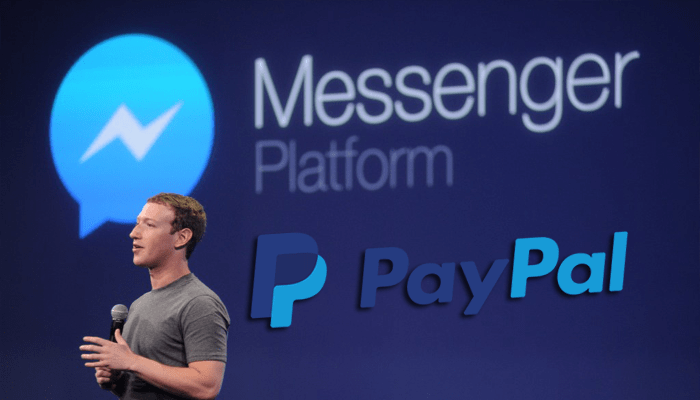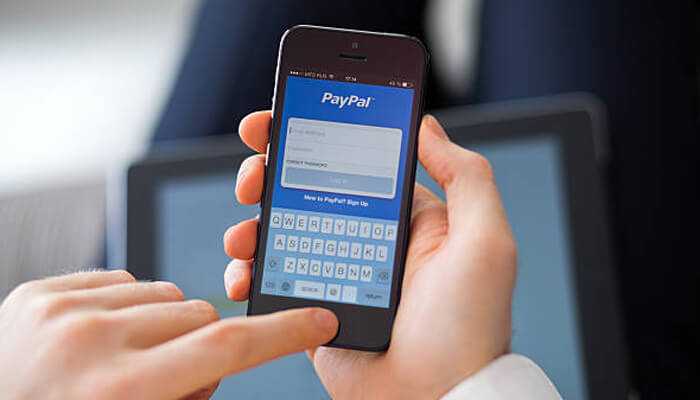PayPal Holdings Inc. is the latest payment provider to look to the world of social media for a new way to grow. Integration with Facebook Inc., announced early Monday in a blog post by PayPal, will have the social network make the payments giant a way to pay across a broader range of new online shopping features. PayPal will also now make it possible to receive messages about any purchase, like a receipt, through Facebook’s Messenger chat service.
While tech companies like Facebook, Apple Inc., and Google Inc. have at times been viewed—or feared—as potential new entrants into payments and banking, arrangements like these suggest the reality may be more complicated. “Most of the tech ecosystem chooses to partner,” said Bill Ready, PayPal’s chief operating officer, in an interview. “Financial services are messy and difficult, and they have regulatory burdens and compliance issues. If you’re not an expert in that space, it’s burdensome to do so.”
Still, PayPal and Facebook remain competitors in some respects. Notably, they offer competing services when it comes to digital person-to-person payments. Many experts see payments integrated into social interactions, like chats or posts, which is commonplace in China, as the future for the U.S. It is still early days, though, in terms of volume.
For now, Payments in Messenger is an alternative to PayPal’s own apps, including the popular Venmo. The new partnership won’t extend to these “P2P” payments, Mr. Readysaid.
People and businesses using Messenger exchange over a billion messages a month, according to Facebook; the company doesn’t disclose payment volume. “We’re thrilled that financial services companies…continue to expand their partnerships with us,” said Stan Chudnovsky, Facebook’s head of product for Messenger, in an email.
Venmo’s app, which allows users to post quirky public messages about payments to friends, is on track to transfer $20 billion this year, PayPal has said. Facebook hired former PayPal President David Marcus as its vice president of messaging products two years ago.
Already, PayPal enables Facebook to let people pay for other services—like ordering a car via Uber Technologies Inc.—from a chat in Messenger.
The new deal will see PayPal and Facebook allow each other’s users to link their accounts and to offer a PayPal payment option across more of Facebook’s new offerings. That includes when merchants sell via online stores within Facebook or when merchants make sales via automated chatbots in Messenger.
The deeper alliance with Facebook is part of PayPal’s broader strategy of joining as many venues for payments as possible, even if they are less profitable, to drive volume. PayPal earlier this year struck new deals with Visa Inc. and MasterCard Inc. to ensure that it is accepted in mobile wallets—though they came at the price of having to promote the use of cards, which carry a higher fee for PayPal.
PayPal last week announced a new deal to work with one of Alibaba Group Holding Ltd.’s sites and power purchases on social media sites, including Pinterest Inc. Buying on a social media service rather than through a seller’s app or website is still relatively nascent, and efforts such as a “buy button” on services like Twitter Inc. have mostly failed to live up to the hype so far.
PayPal and other payment firms have also teamed up with Apple Inc. While Apple Pay does compete with PayPal services such as mobile and web-based One Touch buttons, PayPal’s Braintree payments software business also enables merchants to use Apple Pay.
In September, PayPal’s Venmo—along with firms like Square Inc. and Circle Internet Financial Ltd.—were added to Apple’s iMessage service, making it possible to send a payment via a text. Venmo also lets you ask Siri, Apple’s voice-recognition service, to send money to a friend.
Square’s service provides a payment option for Snap Inc.’s Snapchat.
Circle’s founders, when their Apple service launched, wrote: “The deep integration of consumer payment experiences with messaging will likely define the retail finance franchise of the future.”



